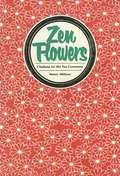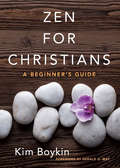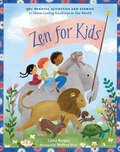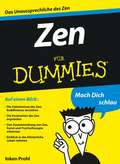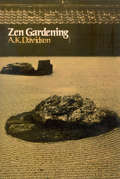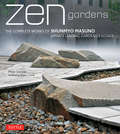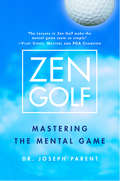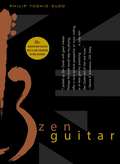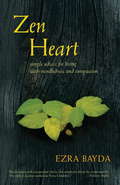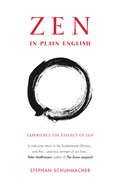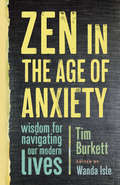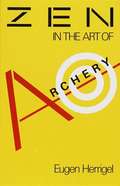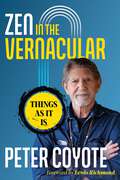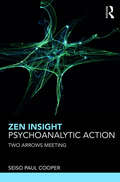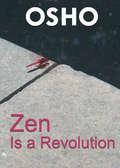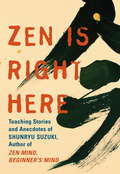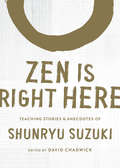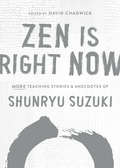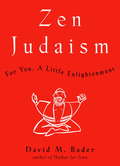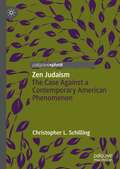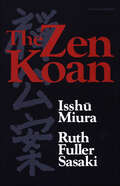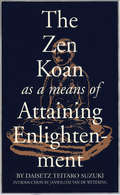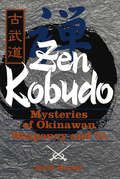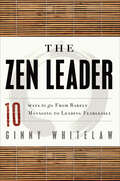- Table View
- List View
Zen Flowers: Chabana for the Tea Ceremony
by Henry MittwerThis Zen flower arranging book teaches the delicate art of Japanese Chabana--the precursor to ikebana.<P><P>Up to now, with the exception of Okakura Kakuzo's excellent account of flowers used in the art of Chanoyu in his delightful The Book of Tea, almost nothing has been available on the subject. To my knowledge, the present volume is the only book written in English that is wholly devoted to the special form of flower arrangement called Chabana.Chabana is a type of flower arrangement that originated in the tea room . Chabana is not only for decoration, for symbolic representation, or for abstract expression of the self. 2,500years ago, Chabana has something in common with one of Shakyamuni Buddha's sermons. Buddha lightly picked a single bloom from a basketful of flowers offered to Him by one of the multitude who came to hear His sermon. Buddha slowly, silently, held up the flower before the congregation. Among the gathering was one of His disciples, Mahakasyapa, who gently smiled as he apprehended the Buddha's gesture. Chabana may not be a flower arrangement having a Zen-like mission, but it certainly is a flower arrangement appreciated by a mind nourished with the Zen principles of simplicity and directness.
Zen for Christians: A Beginner's Guide
by Gerald G. May Kim Boykin"Whereas other Christianity-meets-Buddhism books stress ideology and the intellect, this one emphasizes daily acts of practice." — Publishers Weekly (starred review) In this illuminating and insightful guide, Kim Boykin offers Christians a way to incorporate Zen practices into their lives without compromising their beliefs and faith.Zen for Christians assumes curiosity but no real knowledge as it walks readers through specific concepts of Zen philosophy — including suffering, attachment, and enlightenment — and explains each in a simple but lively way. Sections between chapters gently demonstrate Zen meditation practices, explaining the basics in a clear, engaging manner. Placing Buddhist and Christian teachings side by side helps readers not only understand Zen but also shows their compatibility. Drawing on Dr. Boykin's own personal search through Buddhism and Christianity as well as her background in theological studies, this thought-provoking work illustrates how Zen practice can be particularly useful for Christians who want to enrich their faith by incorporating contemplative practices."An excellent introduction to Zen — clear and to the point, practical, respectful, and even humorous at times." — Yoga Journal "Makes Zen practice more approachable and less esoteric … a straightforward guide for those who want to try Zen for themselves." — Monastic Interreligious Dialogue Bulletin "A trustworthy and delightful guide. Kim Boykin will demystify and deepen your understanding of both the traditions she practices. A gem!" — James W. Fowler, author, Stages of Faith "Kim Boykin writes in the skilled language of simplicity. While addressing those new to Zen, she offers practical wisdom, challenge, and encouragement to all practitioners." — Rose Mary Dougherty, Shalem Institute for Spiritual Formation, Bethesda, Maryland "The great religions of the world have much to learn from each other. Kim Boykin's book is a skillful step in that direction. The heart of the matter of Zen is presented in a direct and informative way that is based on her firsthand experience of Zen training. This should prove to be a helpful guidebook for any Christian who wishes to explore Zen practice." — John Daido Loori, roshi, abbot, Zen Mountain Monastery "This lovely, wise, and practical introduction to Zen keeps its promise of companionship as the kind of spiritual cookbook you can bring right into the kitchen. Recipe-reading like this, in fact, inspires you to get into the kitchen, encourages you to keep at it, and invites you to share your efforts in communion with others." — Steven Tipton, coauthor, Habits of the Heart "An excellent resource on Zen practice, written from a pragmatic, personal, and yet sophisticated point of view. What a fine contribution to Buddhist-Christian understanding!" — Judith Simmer-Brown, coauthor, Benedict's Dharma: Buddhists Comment on the Rule "This is a good-humored, intelligent, nonguilt-inducing book written by a person who shows us clearly what it would be like to reap the benefits of what she preaches." — Roberta Bondi, author, Memories of God and Houses: A Family Memoir of Grace
Zen for Kids: 50+ Mindful Activities and Stories to Shine Loving-Kindness in the World
by Laura BurgesEleven engaging Zen-inspired stories and fifty activities to help kids (ages 4–8) learn about patience, kindness, honesty, sharing and forgiveness.Dive into 11 engaging stories drawn from different cultures, each concluding with short reflections, questions, and fun, thought-provoking activities that teach children how to integrate the theme of the story into their lives. There are 53 activities, including:Writing haikuSitting zazenObserving, making, and appreciating foodGrowing plantsSpreading kindness and performing secret good deedsLearning and writing about family historyand more!
Zen für Dummies (Für Dummies)
by Inken ProhlWas bringt Menschen dazu, stundenlang regungslos auf einem Kissen zu sitzen? Die Faszination des Zen-Buddhismus ist groß, da nimmt so mancher Beschwernisse auf sich bei der Suche nach Erkenntnis. Inken Prohl hat das Unaussprechliche des Zen in leicht verständliche Worte gefasst. Sie zeigt, warum das angebliche "Nichts" des Zen - keine Lehre und keine Antworten - gerade für westliche Sinnsuchende so attraktiv ist, was es mit der besonderen Beziehung zwischen Schüler und Meister auf sich hat und wie die vollkommene innere Befreiung erreicht werden kann.
Zen Gardening
by A. K. DavidsonThe Zen gardens of Japan are places in which to meditate. They can be anything from a landscaped garden, complete with waterfalls, to a bed of raked pebbles. This ancient way of gardening goes back to the Zen Buddhist priest-gardeners of the thirteenth century. Based on abstract compositions, relying on simplicity and suggestion, their gardens were designed to liberate the imagination, while providing a starting point in the appreciation of everyday things.Zen Gardening is the first handbook to examine the concepts and techniques that make up this garden art and to apply them to the West. It explains the historical relationship between Zen and the development of gardens, and gives practical suggestions for the creation of a Zen garden at home. The chapters on the garden components and their adaptation for the West, principles of design, and construction work, are illustrated with over 150 line drawings. Step by step they show us how to make the most of corners of large gardens, of plots not large enough for lawns and flower beds, or of awkward passageways, alleys and terraces.The principles of Zen gardening are particularly relevant in our crowded conurbations. Keir Davidson's thoughtful and practical approach enables us to maximize our garden space and to create areas of calm in our own immediate environment. Without precedent in the West, his book will be a source of delight to gardeners of every persuasion.
Zen Gardens
by Mira Locher Uchida ShigeruShunmyo Masuno, Japan's leading garden designer, is at once Japan's most highly acclaimed landscape architect and an 18th-generation Zen Buddhist priest, presiding over daily ceremonies at the Kenkoji Temple in Yokohama. He is celebrated for his unique ability to blend strikingly contemporary elements with the traditional design vernacular. He has worked in ultramodern urban hotels and in some of Japan's most famous classic gardens. In each project, his work as a designer is inseparable from his Buddhist practice. Each becomes a Zen garden, "a special spiritual place where the mind dwells."This beautiful book, illustrated with more than 400 drawings and color photographs, is the first complete retrospective of Masuno's work to be published in English. It presents 37 major gardens around the world in a wide variety of types and settings: traditional and contemporary, urban and rural, public spaces and private residences, and including temple, office, hotel and campus venues. Masuno achieved fame for his work in Japan, but he is becoming increasingly known internationally, and in 2011 completed his first commission in the United States which is shown here.The book, divided into three chapters, covers: "Traditional Zen Gardens," "Contemporary Zen Gardens," and "Zen Gardens outside Japan." Illustrated with photographs and architectural plans or sketches, each garden is described and analyzed by author Mira Locher, herself an architect and a scholar well versed in Japanese culture.Celebrating the accomplishments of a major, world-class designer, Zen Gardens also serves as something of a master class in Japanese garden design and appreciation: how to perceive a Japanese garden, how to understand one, even how to make one yourself. Like one of Masuno's gardens, the book can be a place for contemplation and mindful repose.
Zen Golf: Mastering the Mental Game
by Joseph ParentThe best players know that golf is a game of confidence, and most important, concentration-the ability to focus and block out distraction. The goal of achieving clear thought is also at the heart of Buddhist teachings. In his highly original and groundbreaking book, noted PGA coach and Buddhist instructor, Dr. Joseph Parent, draws on this natural connection and teaches golfers how to clear their minds, achieve ultimate focus, and play in the moment for each shot.Zen Golf presents a simple system for building "mental game mastery." Dr Parent's unique PAR Approach (focusing on Preparation, Action, and Response to Results) guides golfers with specific techniques for each aspect of their games. In chapters such as "How to Get From the Practice Tee to the First Tee", "You Produce What You Fear", and "How to Enjoy a Bad Round of Golf", the author shares a personal teaching regimen that has helped improve the games of professionals and amateurs alike. By combining classic insights and stories from Zen tradition, Zen Golf helps eliminate the mental distractions that routinely cause poor shots and loss of concentration, allowing golfers to feel in "the zone" that professionals have learned to master.Clear, concise, and enlightening, Zen Golf shows golfers how to prepare for, execute, and equally important, respond the results of any golf shot. A different approach to golf instruction, this book shapes ancient philosophies into new teachings.From the Hardcover edition.
Zen Guitar: The Zen Way To Play Guitar, Book And Cd
by Philip Toshio SudoUnleash the song of your soul with Zen Guitar, a contemplative handbook that draws on ancient Eastern wisdom and applies it to music and performance.Each of us carries a song inside us, the song that makes us human. Zen Guitar provides the key to unlocking this song--a series of life lessons presented through the metaphor of music. Philip Sudo offers his own experiences with music to enable us to rediscover the harmony in each of our lives and open ourselves to Zen awareness uniquely suited to the Western Mind. Through fifty-eight lessons that provide focus and a guide, the reader is led through to Zen awareness. This harmony is further illuminated through quotes from sources ranging from Eric Clapton and Jimi Hendrix to Miles Davis. From those who have never strummed a guitar to the more experienced, Zen Guitar shows how the path of music offers fulfillment in all aspects of life--a winning idea and an instant classic.
Zen Heart: Simple Advice for Living with Mindfulness and Compassion
by Ezra BaydaThere's a secret to spiritual practice, and it's surprisingly simple: learn to be present with attention. Do that, and the whole world becomes your teacher, you wake up to the sacredness of every aspect of existence, and compassion for others arises without even thinking about it. In Zen Heart, Bayda provides a wealth of practical advice for making difficult experiences a valued part of the path and for making mindfulness a daily habit.
Zen in Plain English
by Stephan SchuhmacherNo other book quite engages the reader in the kinds of perceptions and experiences that the seeker will have while following this path. The Zen masters are famous for their unorthodox ways of teaching the wisdom of the 'thing itself'. Their Koans - paradoxical stories, and questions - are designed to rid the mind of over-sophisticated responses. A selection of tales from the great Zen teachers, this book coaxes the reader into a direct encounter with the life-changing perceptions of the Zen mind. Challenging us to find 'a solution that resolves and dissolves the knots in heart and mind, the chronic cramp that prevents us from breathing freely, from giving ourselves without reserve to life in all its delightful and painful facets, and from being at peace with life and with death.' In this process we are confronted by the limits of rational meaning - and we begin to understand why Zen masters use humour and paradox to lead us to the very edge of the precipice of reason, and why, at that critical point, we are gently pushed over.'Stephan Schumacher's innovative format and his fresh interpretations of this fine selection of stories from the great teachers are a useful introduction to Zen practice, and more importantly a welcome return to the fundamental Dharma of no-self, not-knowing, the thing- itself and the beauty and precision of this moment-by-moment precious moment of our lives.' Peter Matthiessen(Muryo Roshi)
Zen in the Age of Anxiety: Wisdom for Navigating Our Modern Lives
by Tim Burkett Wanda IsleZen wisdom for identifying the causes of mental and emotional anxiety epidemic in today's world and for finding the path to a peaceful heart in the midst of them--a path that leads directly though the center of the anxiety we're trying to escape.Wrestling with fear doesn’t have to be a negative experience. This book offers an approach to life that unlocks a new way of thinking and being in the world, one that leads directly through the center of the anxieties we seek to avoid.Written in the style of an owner’s manual, a guide to being human, Burkett focuses on areas of pain and anxiety as they tend to manifest for modern people: feelings of unworthiness, and issues surrounding sex, money, failure, and even death. Providing wisdom from Zen (channeled through his many experiences as a psychotherapist) and using language and metaphors from popular culture, he takes anxiety and teaches us to turn those fears into the building blocks of a fulfilling life.
Zen in the Art of Archery
by Eugen HerrigelSince its original publication in 1953, Zen in the Art of Archery has become one of the classic works on Eastern philosophy, the first book to delve deeply into the role of Zen in philosophy, development, and practice of Eastern martial arts. Wise, deeply personal, and frequently charming, it is the story of one man's penetration of the theory and practice of Zen Buddhism. Eugen Herrigel, a German professor who taught philosophy in Tokyo, took up the study of archery as a step toward the understanding of Zen. Zen in the Art of Archery is the account of the six years he spent as the student of one of Japan's great Zen masters, and the process by which he overcame his initial inhibitions and began to look toward new ways of seeing and understanding. As one of the first Westerners to delve deeply into Zen Buddhism, Herrigel was a key figure in the popularization of Eastern thought in the West, as well as being a captivating and illuminating writer.
Zen in the Vernacular: Things As It Is
by Peter Coyote• Shows how Zen offers a creative problem-solving mechanism and moral guide ideal for the stresses and problems of daily life• Shares the author&’s secular, vernacular interpretations of the Four Noble Truths, the Three Treasures, the Eightfold Path, and other fundamental Buddhist ideasDuring the nearly 3,000 years since the Buddha lived, his teachings have spread widely around the globe. In each culture where Buddhism was introduced, the Buddha&’s teachings have been pruned and modified to harmonize with local customs, laws, and cultures. We can refer to these modifications as &“gift wrapping,&” translating the gifts of Buddha&’s teachings in ways sensible to particular cultures in particular times. This gift-wrapping explains why Indian, Tibetan, Vietnamese, Japanese, Chinese, and Indonesian Buddhism have significant differences.In this engaging guide to Zen Buddhism, award-winning actor, narrator, and Zen Buddhist priest Peter Coyote helps us peer beneath the Japanese gift-wrapping of Zen teachings to reveal the fundamental teachings of the Buddha and show how they can be applied to contemporary daily life. The author explains that the majority of Western Buddhists are secular and many don&’t meditate, wear robes, shave their heads, or believe in reincarnation. He reminds us that the mental/physical states achieved by Buddhist practice are universal human states, ones we may already be familiar with but perhaps never considered as possessing spiritual dimensions.Exploring Buddha&’s core teachings, the author shares his own secular and accessible interpretations of the Four Noble Truths, the Three Treasures, and the Eightfold Path within the context of his lineage and the teachings of his teacher and the teachers before him. He looks at Buddha&’s teachings on our singular reality that appears as a multiplicity of things and on the &“self&” that perceives reality, translating powerful spiritual experience into the vernacular of modern life.Revealing the practical usefulness of Buddhist philosophy and practice, Zen in the Vernacular shows how Zen offers a creative problem-solving mechanism and moral guide ideal for the stresses and problems of everyday life.
Zen Insight, Psychoanalytic Action: Two Arrows Meeting
by Seiso Paul CooperDrawing from original source material, contemporary scholarship, and Wilfred Bion’s psychoanalytic writings, Zen Insight, Psychoanalytic Action: Two Arrows Meeting introduces the Zen notion of "gūjin," or total exertion, and elaborates a realizational perspective that integrates Zen Buddhism and psychoanalysis. Developed by the thirteenth century Zen teacher and founder of the Japanese Soto Zen school, Eihei Dogen, gūjin finds expression and is referenced in various contemporary scholarly and religious commentaries. This book explains this pivotal Zen concept and addresses themes by drawing from translated source material, academic scholarship, traditional Zen kōans and teaching stories, extensive commentarial literature, interpretive writings by contemporary Soto Zen teachers, psychoanalytic theory, clinical material, and poetry, as well as the author’s thirty years of personal experience as a psychoanalyst, supervisor, psychoanalytic educator, ordained Soto Zen priest, and transmitted Soto Zen teacher. From a realizational perspective that integrates Zen and psychoanalytic concepts, the book addresses anxiety-driven interferences to deepened Zen practice, extends the scope and increases the effectiveness of clinical work for the psychotherapist, and facilitates deepened experiences for both the Buddhist and the secular meditation practitioner. Two Arrows Meeting will be of great interest to researchers in the fields of Zen Buddhism and psychoanalysis. It will also appeal to meditation practitioners and psychoanalysts in practice and training.
Zen Is a Revolution
by Osho Osho International FoundationIn this talk Osho takes his audience into the world of ZEN. "There are a few essential things which make Zen absolutely different from any kind of teaching. The most important of these essentials is that Zen is a revolution. All other religions are servants to the vested interests. The rich people and the powerful people, the politicians, have dominated all the religions. The priests have been nothing but servants to these criminals. It is such a worldwide conspiracy that no one recognizes it. It is so obvious and so simple that we are from the very beginning, from our very childhood, being programmed." From an original series: Rinzai: Master of the Irrational, by Osho.
Zen Is Right Here: Teaching Stories and Anecdotes of Shunryu Suzuki, Author of Zen Mind, Beginner's Mind
by David ChadwickShunryu Suzuki's extraordinary gift for conveying traditional Zen teachings using ordinary language is well known to the countless readers of Zen Mind, Beginner's Mind. In Zen Is Right Here, his teachings are brought to life powerfully and directly through stories told about him by his students. These living encounters with Zen are poignant, direct, humorous, paradoxical, and enlightening; and their setting in real-life contexts makes them wonderfully accessible. Like the Buddha himself, Suzuki Roshi gave profound teachings that were skilfully expressed for each moment, person, and situation he encountered. He emphasized that while the ungraspable essence of Buddhism is constant, the expression of that essence is always changing. Each of the stories presented here is an example of this versatile and timeless quality, showing that the potential for attaining enlightenment exists right here, right now, in this very moment.
Zen Is Right Here: Teaching Stories and Anecdotes of Shunryu Suzuki, Author of Zen Mind, Beginner's Mind
by Shunryu SuzukiPersonal stories and anecdotes of the trailblazing Zen teacher Suzuki Roshi--now reissued in hardcover in tandem with the publication of the follow-up volume, Zen Is Right Now. Shunryu Suzuki&’s extraordinary gift for presenting traditional Zen teachings using ordinary language is well known to the countless readers of Zen Mind, Beginner&’s Mind. In Zen Is Right Here, his teachings are brought to life through stories told by his students. These living encounters with Zen are poignant, direct, humorous, paradoxical, and enlightening—and their setting in real-life contexts makes them wonderfully accessible. Like the Buddha himself, Shunryu Suzuki gave profound teachings that were skillfully expressed for each moment, person, and situation he encountered. He emphasized that while the essence of Buddhism is constant, the expression of that essence is always changing. Each of the stories presented here is an example of this versatile and timeless quality, showing that the potential for attaining enlightenment exists right here, at this very place.
Zen Is Right Now: More Teaching Stories and Anecdotes of Shunryu Suzuki, Author of Zen Mind, Beginner's Mind
by Shunryu SuzukiIn this new collection of quotes from Shunryu Suzuki Roshi and stories from his students, the presence, wisdom, and humor of a great Zen teacher come alive once more.The teachings of Shunryu Suzuki have served for innumerable people as the gateway to Zen practice and meditation. In Zen Is Right Now, devoted student and biographer David Chadwick sheds new light on Suzuki&’s presence and teachings through selected quotes from his lectures and a variety of stories told by his students. Complementary to another collection about Suzuki, Zen Is Right Here, this book offers a joyful bounty of anecdotes and insights, revealing a playful and deeply wise teacher who delighted in paradox and laughed often. Each of the stories and quotes presented here is an example of the versatile and timeless quality evident in Suzuki&’s teaching, showing that the potential for attaining enlightenment exists right now, in this very moment.
Zen Judaism
by David M. BaderFew spiritual practices are more intriguing or elusive than those of Zen Judaism," says David M. Bader in the foreword to Zen Judaism. "This growing movement offers a unique way to follow in the footsteps of the Buddha, ideally without gaining quite so much weight." These nearly 100 sacred teachings are capable "of bringing about an enlightenment experience so pure, so elevating, and so intense, you could plotz." For you, some samples:To know the Buddha is the highest attainment. Second highest is to go to the same doctor as the Buddha.Be here now. Be someplace else later. Is that so complicated? There is no escaping Karma. In a previous life, you never called, you never wrote, you never visited. And whose fault was that?If there is no self, whose arthritis is this? Be patient and achieve all things. Be impatient and achieve all things faster.From the Hardcover edition.
Zen Judaism: The Case Against a Contemporary American Phenomenon
by Christopher L. SchillingContemporary Judaism is transforming, especially in America, from a community experience to more of a do-it-yourself religion focused on the individual self. In this book Christopher L. Schilling offers a critique of this transformation. Schilling discusses problematic aspects of Jewish mindfulness meditation, and the relationship between Judaism and psychedelics, proceeding to explore the science behind these developments and the implications they have for Judaism.
The Zen Koan: Its History and Use in Rinzai Zen
by Isshu Miura Ruth Fuller SasakiThe first scholarly examination in any language of the historical development and traditional method of koan study in Zen Buddhism. Foreword by Ruth Fuller Sasaki; Index; ink drawings by Hakuin Ekaku.A Helen and Kurt Wolff Book.
Zen Koan as a Means of Attaining Enlightenment
by Daisetz Teitaro SuzukiZen Koan as a Means of Attaining Enlightenment Presents the history and application of the koan exercise--the means for realizing enlightenment--with depth and clarity.<P><P>The koan system has effected a special development in Zen Buddhism, and is a unique contribution to the history of religious consciousness. When the importance of the koan is understood, it may be said that more than half of Zen is understood.
Zen Kobudo
by Mark BishopKobudo, the famous armed Okinawan fighting art that utilizes common farming implements in combat, and Te, the ancient Okinawan art of armed and unarmed combat, are two of the world's most widely practiced yet least-understood martial arts. This book studies the individual Kobudo and Te systems as they are practiced in Okinawa today and discusses their various histories and the lives of the masters who have most influenced them. Spiritualism in the Okinawan arts is also covered in detail, as the author masterfully describes the mix of Zen and native beliefs that are vital to these arts, yet a component that has been all but ignored by previous researchers. In addition, this is the first work to discuss anthropological theories on Okinawa and the development of fighting arts there from the Stone Age. This complete and wide-ranging study of Okinawan weaponry, history, and training is the ultimate guide to these important fighting arts.
Zen Kobudo
by Mark BishopKobudo, the famous armed Okinawan fighting art that utilizes common farming implements in combat, and Te, the ancient Okinawan art of armed and unarmed combat, are two of the world's most widely practiced yet least-understood martial arts. This book studies the individual Kobudo and Te systems as they are practiced in Okinawa today and discusses their various histories and the lives of the masters who have most influenced them. Spiritualism in the Okinawan arts is also covered in detail, as the author masterfully describes the mix of Zen and native beliefs that are vital to these arts, yet a component that has been all but ignored by previous researchers. In addition, this is the first work to discuss anthropological theories on Okinawa and the development of fighting arts there from the Stone Age. This complete and wide-ranging study of Okinawan weaponry, history, and training is the ultimate guide to these important fighting arts.
The Zen Leader: 10 Ways to Go From Barely Managing to Leading Fearlessly
by Ginny WhitelawA guide to using pressure to be a better leader through principles of Zen Buddhism.Leaders today face nearly impossible tasks. Forced to do more with less, expand globally, innovate quickly, inspire broadly and—oh, yes—balance work and family. How can one manage all this pressure?The Zen Leader does not encourage you simply to “be peaceful.” Neither does it suggest you work harder, faster, or ignore the pressure. Quite the opposite: it’s about using the pressure to propel “flips” in consciousness that create transformational leaders, leaders who create the future with joy and enthusiasm, rather than drive themselves and their people to exhaustion.The Zen Leader guides you through ten “flips” that take you from barely managing to mastering change—not by doing more, zoning out, or pretending you have all the answers. Chapter by chapter, you’ll learn how to make the “flips” that reframe your life, your leadership, and your world. Discover how you can get out of your own way and realize the Zen Leader in you.Praise for The Zen Leader“The Zen Leader provides a calm and reassuring voice—telling us what is important about leadership and about ourselves. She distills leadership to its essence, and offers simple, easily understandable tools for any current or aspiring leader to understand, use, and build on his or her own natural gifts.” —David Dotlich, chairman of Pivot and coauthor of Why CEOs Fail; Head, Heart, and Guts; and other books on leadership“The chapter entitled “From Controlling to Connecting” will change how you interact with others, and will enrich your life. You will see the vision of what you want our world to be and help strengthen the business connections we all need.” —Blythe McGarvie, author of Shaking the Globe“Before you can effectively lead others, you must be able to control yourself first. Dr. Whitelaw invites us on a journey of self-discovery using easy-to-follow exercises. By learning to experience for yourself the power of a unified mind and body, you will begin to taste your full potential.” —David Shaner, author of The Seven Arts of Change
